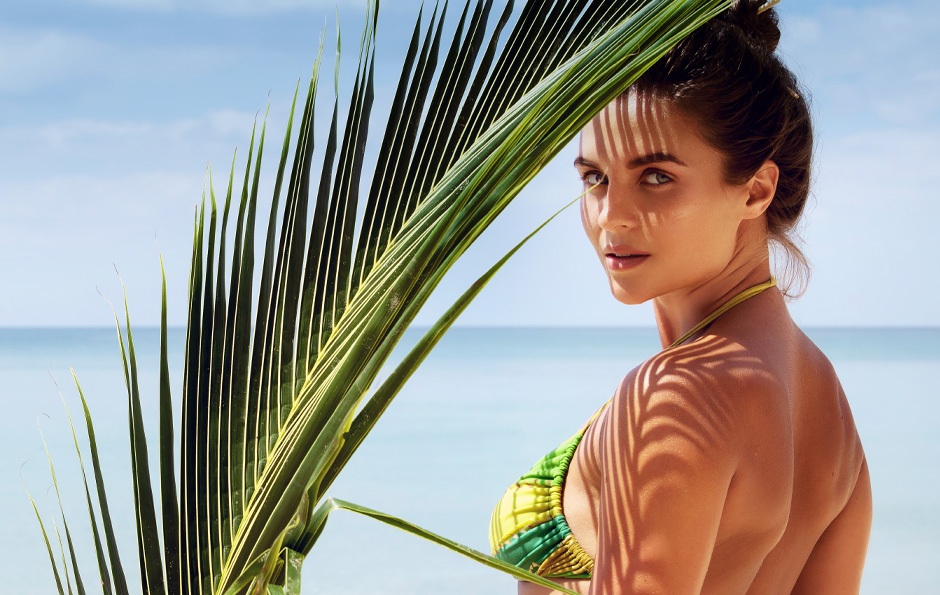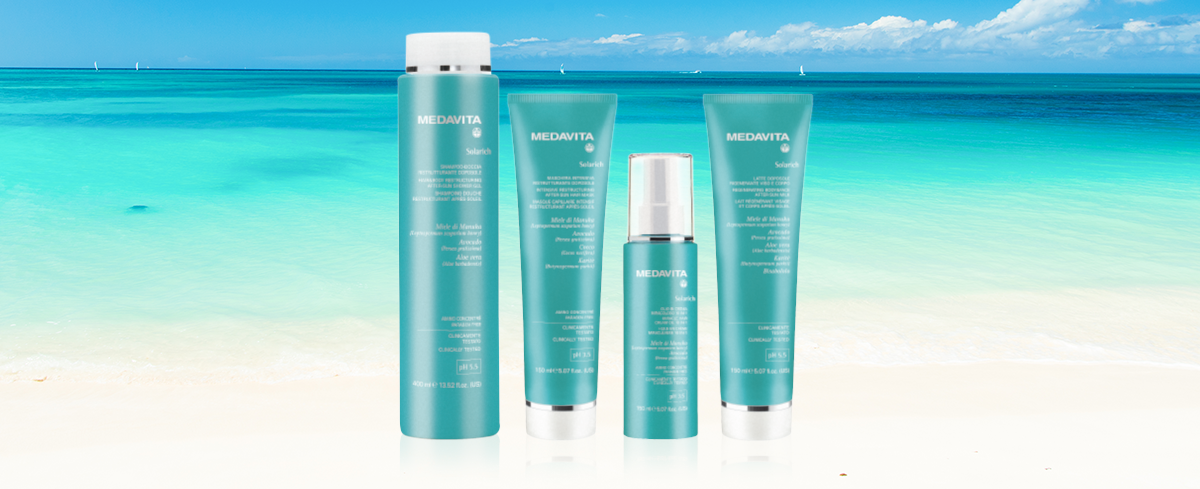
HAPPY SUN. SOAK UP THE SUN WHILE PROTECTING YOUR HAIR AND SKIN.
Sun is essential to life and offers many benefits to our health. However, it is important not to expose our skin to too much sun, as its UV rays can have harmful effects on it. To protect against them, while still enjoying the many benefits of the sun’s rays, we must always use products with a high sun protection factor.
UV RAYS GUILTY OR NOT GUILTY?
UV rays are primarily responsible for the harmful effects the sun has on our skin: UVB rays (with B standing for "burn" and "bronze", the colour we aspire to) are particularly effective in stimulating our tan but are also the main cause of burns. UVA rays (A for "allergies" and "age"), on the other hand, are more dangerous because they do not cause pain but penetrate deeper into the skin, speeding up the ageing process and triggering off sun intolerances, commonly known as sun allergies, and pigment disorders (melasma, dark spots). UVB and UVA radiation can also alter the cell nucleus, damaging our DNA. If this invisible damage continues over time, in the long term it can lead to the development of neoplasia. Just like our skin, our hair fibre tends to dry out when we’ve been in the sun for a long time: both its structure and the scalp can suffer. Dryness is due to the sebaceous glands in the scalp not producing enough sebum, and this condition is exacerbated in the summer when sea water and the sun’s rays can have a dehydrating effect. They reduce the lipid content in hair, making it look dull and lifeless, more prone to breakage and causing multiple split ends. More sun-induced damage is caused by photo-oxidation of melanin, a process which modifies the natural colour of our hair, making it lighter but at the same time lowering its defences. Our hair has a limited lifespan and although it is continuously renewed, it is more prone to falling out when the scalp is under regular attack from external aggressions. Knowing when and how to go out in the sun is important if we are to protect ourselves from the harmful effects of UV rays, but it doesn’t mean we have to avoid them completely. The sun can actually have beneficial effects on our hair, as it synthesizes the vitamin D in our scalp which stimulates growth. It can also have a positive effect on greasy hair, as it helps rebalance excessive sebum production. It only takes a couple of days of excessive sun exposure to affect the vitality and shine of our hair, so what should we do to prevent it? THE GOLDEN RULE PROTECTION Always follow a couple of simple rules when you go out in the sun: » stay in the shade and avoid going out at the hottest times of the day » do not expose children and newborn babies to direct rays » protect yourself and your children by wearing a hat, sunglasses and a T-shirt » choose the right sun protection factor for your phototype » a p p l y plenty of sunscreen before going out in the sun; reapply generously and frequently, especially after swimming, perspiring or towelling off. » u s e s h a m p o o s, shampoo and shower gels, masks, oils, creams and after-sun which contain moisturising, protective substances which also prevent photo-ageing, for example antioxidants.  These molecules help boost photo-protection by increasing the degree of absorption of UV radiation and stimulating their antioxidant action: plant-based extracts rich in polyphenols protect against immunosuppression and damage to our DNA by ultraviolet rays, thanks to their ability to fight free radicals; antioxidant vitamins such as tocopherols, tocotrienols and vitamin C. Manuka honey has similar properties: despite little being known about it up to a short time ago, it is now one of the most widely researched honeys. Its special characteristics make it highly effective for treating wounds and as an antibacterial, the perfect substance to add to anti-age and moisturising formulas. Manuka honey from New Zealand is not widely used, even though its efficacy has been acknowledged for over thirty years. Dark and creamy, it comes from the flower of the Manuka tree and has a high percentage of polyphenols, as well as powerful antioxidant properties which help protect the skin from oxidative stress caused by factors such as pollution and UV rays. It also helps keep the skin barrier hydrated, thanks to its high sugar and mineral content. What makes it so special? Honey has been used in medicine since ancient times: it is an antiseptic, it helps wounds heal and can be used to treat acne, inflammations and dry skin; the Manuka variety is a kind of “turbo” version, thanks to its high concentration of antioxidants and methylglyoxal, an antibacterial component found in small amounts in most honeys but in large quantities in the Manuka variety. This, therefore, makes it perfect for treating wounds and skin inflammations and as an anti-age solution.
These molecules help boost photo-protection by increasing the degree of absorption of UV radiation and stimulating their antioxidant action: plant-based extracts rich in polyphenols protect against immunosuppression and damage to our DNA by ultraviolet rays, thanks to their ability to fight free radicals; antioxidant vitamins such as tocopherols, tocotrienols and vitamin C. Manuka honey has similar properties: despite little being known about it up to a short time ago, it is now one of the most widely researched honeys. Its special characteristics make it highly effective for treating wounds and as an antibacterial, the perfect substance to add to anti-age and moisturising formulas. Manuka honey from New Zealand is not widely used, even though its efficacy has been acknowledged for over thirty years. Dark and creamy, it comes from the flower of the Manuka tree and has a high percentage of polyphenols, as well as powerful antioxidant properties which help protect the skin from oxidative stress caused by factors such as pollution and UV rays. It also helps keep the skin barrier hydrated, thanks to its high sugar and mineral content. What makes it so special? Honey has been used in medicine since ancient times: it is an antiseptic, it helps wounds heal and can be used to treat acne, inflammations and dry skin; the Manuka variety is a kind of “turbo” version, thanks to its high concentration of antioxidants and methylglyoxal, an antibacterial component found in small amounts in most honeys but in large quantities in the Manuka variety. This, therefore, makes it perfect for treating wounds and skin inflammations and as an anti-age solution.


Validate your login
Sign In
Registrati a "Medavita Salon Friends" e ricevi vantaggi e promozioni per i servizi in salone.
Create New Account